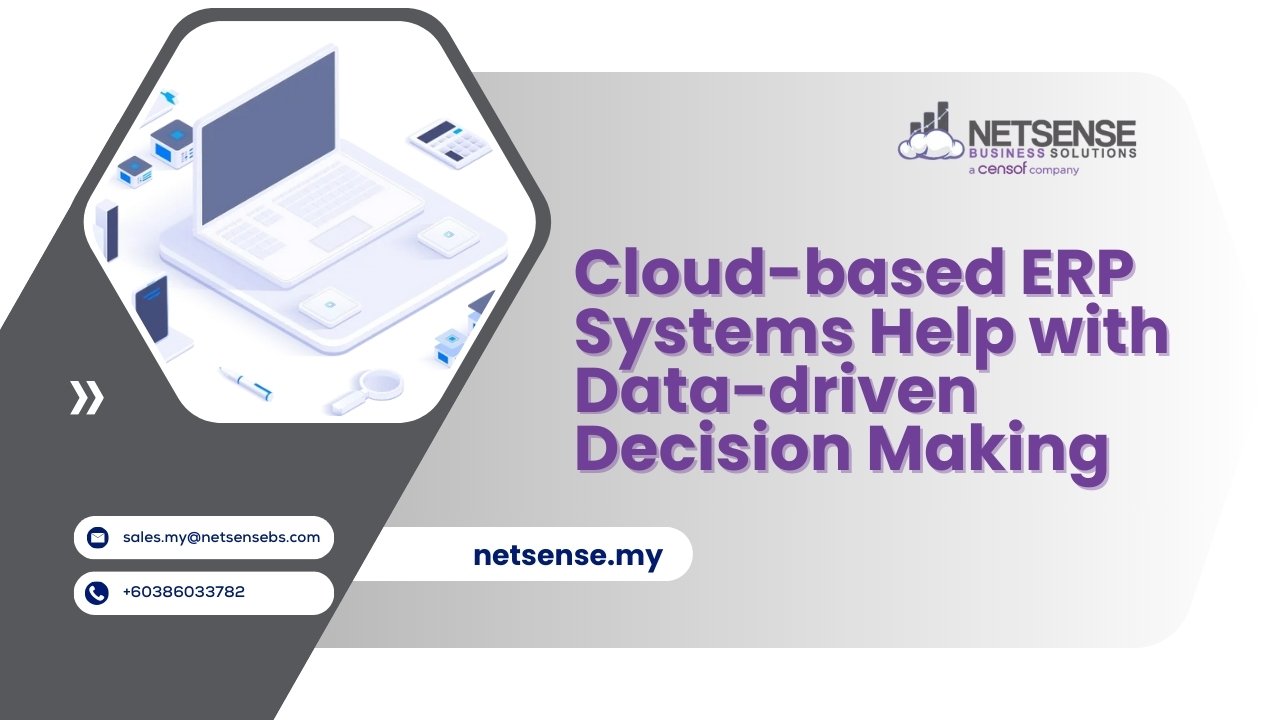With today’s rapid pace of business, that gut instinct just won’t work. Decision makers need reliable and timely data to lead their organisations to grow, be more efficient, and become more sustainable.
Cloud-based ERP (Enterprise Resource Planning) systems are gaining attention in Malaysia and surrounding markets for just this reason: they enable data-driven decisions to be not only possible, but also practical and powerful.
If you’re thinking about an ERP solution for your organisation, read on for how cloud-based ERP has the potential to assist you in making better decisions—and what to watch out for to maximise your investment.
What is a Cloud-based ERP?
A cloud ERP solution is software that’s located off-site on secure servers that are managed by third-party providers. All of the modules – finance, operations, HR, inventory, procurement, CRM, etc., can be accessed via the internet on any device. No on-site clunky infrastructure; data is flowing and accessible wherever and whenever.
Netsense is a proponent of cloud ERP systems (such as Acumatica ERP) that are designed for any size and industry, providing everything from financial tracking, operational visibility, and real-time dashboards.
Why Data-driven Decision-Making Matters
Before we dive into “how”, let’s be clear on “why”. The companies that make decisions based on real data are better at:
- Spotting opportunities and challenges early
- Reducing risks
- Improving operational efficiency
- Tracking performance against targets
- Staying agile when market changes hit
In competitive SMEs and mid-markets, having that edge can mean the difference between thriving and lagging.
How Cloud-based ERP Makes It Happen?
Here are key ways cloud-based ERP systems help business leaders become more data-driven:
Real-Time Access to Data
Cloud ERP systems update data as events happen – a sale is made, an adjustment is made to inventory, a transaction is recorded – and so the latest insights are available for real-time action, with none of the waiting for manual reports and analysis. This supports quicker actions whenever demand is shifting, availability is compromised, or finances dip.
Integrated, Single Source of Truth
Instead of operating in separate systems for accounting, procurement, HR, CRM, etc., cloud ERP provides a single platform with everything in it. No more “who has the right numbers?” debates. Executives have consistent metrics and dashboards based on the same underlying data, specifically allowing for direct and equitable comparisons.
Powerful Reporting & Analytics
Cloud ERP often comes with built-in analytics and dashboards. You can slice data by region, product line, department—whatever is useful. Visualisations like graphs, heat maps, and alerts help you spot trends and anomalies. Netsense’s solutions emphasise “Dashboards: evaluate your data in real-time”, helping you pull insights with drag-and-drop ease.
Scalability & Flexibility
Cloud systems scale with your business. As your operations grow—more branches, more products, more users—your ERP can handle the extra load. Plus, modules can be added (or removed) depending on needs, avoiding paying for unused features. Malaysians in trading, manufacturing, construction, etc., benefit because they often have fluctuating seasonal demands.
Automation & Workflow Streamlining
Automation reduces error and lag. Tasks like purchase orders, vendor payments, inventory re-orders, and payroll—all become more efficient. Because many repetitive activities are automated, your staff can focus on what matters—analysis, strategy, and improvements.
Improved Forecasting & Planning
Securely stored historical data in the cloud allows for credible forecasting: sales projections, cash flow, and resource requirements. Patterns and trends over weeks, months, or even years become less ambiguous.
Want to estimate the impact on margin from a price change? Desire to plan for probable supply chain delays? Data-driven information gives you the ability to plan confidently.
Remote Collaboration & Decision Making
In a cloud ERP, users from different departments or locations see the same dashboards. Remote managers, branch offices, field service teams—everyone can access updated data.
This is especially useful in Malaysia, where businesses may have distributed operations (Klang Valley + Penang + East Malaysia, etc.). Shared visibility reduces delays and ensures everyone works with the same facts.
Final Thoughts
In order to lead your market instead of trailing behind it, you have to allow data to inform your decisions. Cloud ERP systems are not about simply “digitising” the way you do things—they allow you to see, understand, and do.
Your decisions will be founded in data, not speculation, driven by real-time data and analytics across integrated systems and flexible processes. At Netsense, our cloud ERP solutions are aimed at providing you with clarity, control, and insight.
If you are engaged in trading, manufacturing, providing services, construction, or a combination, your investment in data-driven decision making will represent one of the best investments you can ever make.
